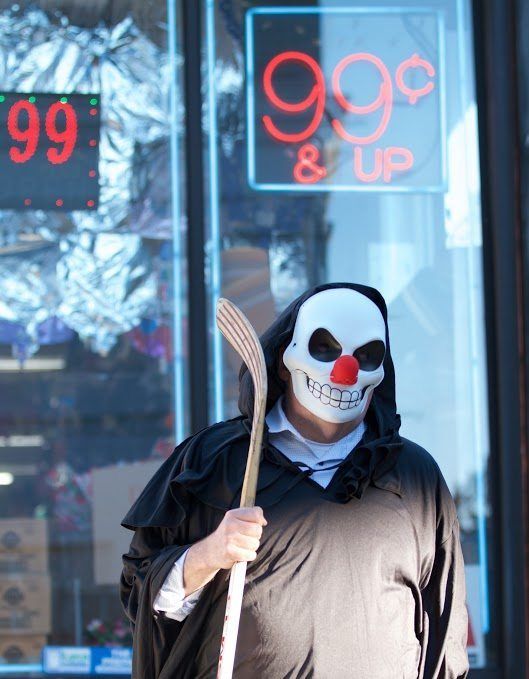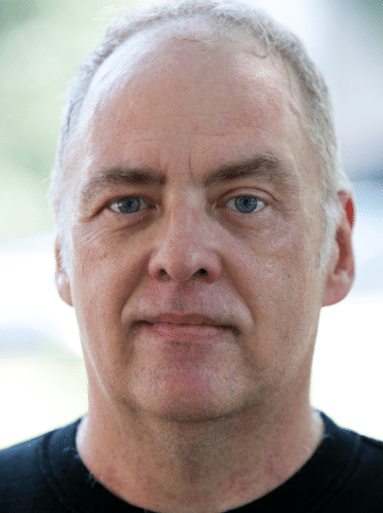In Search Of Venues For Politically Charged Theater In Ditmas Park

From his Midwood home, playwright & performer D.M. Kinch has watched venues for alternative theater appear and disappear in Ditmas Park over the past 30 years.
Kinch would welcome theater venues back to the neighborhood, especially venues to stage the politically charged solo shows that are his specialty. But he isn’t standing idle until that happens; for the fifth anniversary of Occupy Wall Street on Saturday, September 17, he’ll present an updated version of How to Stop the Empire While Keeping Your Day Job in Zuccotti Park, where the Occupy movement was launched in 2011.
Kinch will also perform his latest drama, Planet Hospice, at Manhattan’s Theater Row in November, as part of an annual international theater festival for one-person shows.
“There was nothing here, and then there started to be something here,” Kinch said, recalling the arrival of the Vox Pop cafe on Cortelyou Road in 2004.
But he also remembers cycling through the neighborhood from Midwood to Prospect Park before the development of the commercial strip. “There were 99 cent stores, there were a lot of used furniture places. There was a whole row of garage doors that never opened.”
Kinch had been looking for places to perform the kind of political theater he’d been developing since the 90s. He studied acting at the University of South Florida before moving to New York, “because that was the logical place where people who specialize in the arts should live,” he said.
With a Master’s degree in theater from Brooklyn College, Kinch had already written several conventional plays when the New York Fringe Festival premiered in 1997.

Kinch wrote A Clown, A Hammer, A Bomb and God, a one-man show based on the story of Catholic Priest Carl Kabat. “He looked at his ecclesiastical calendar and he noticed that Good Friday 1994 fell on April Fool’s Day,” Kinch explained. “So he dressed in a clown suit and broke into a Minuteman Missile base. He hammered the silo doors shut on the missiles so they couldn’t be fired, saying ‘I’m doing this because I’m a fool for Christ.’”
The success of the play taught Kinch a valuable lesson about the economic virtue of one-man shows. “You can rehearse in somebody’s bedroom. If you keep you sets simple and your props simple, you can carry everything in a backpack.”
In addition to touring what came to be known as “the Clown play,” Kinch continued writing plays for single performers, sometimes himself and sometimes other actors. The small scale shows made staging productions much easier, but in time the political themes created a different set of challenges.
“I couldn’t find gigs for The Clown Play after 9/11. Because it has a very strong pacifist message, nobody wanted to touch it,” Kinch said.
That made the arrival of Vox Pop, in the spot now occupied by Lea, particularly welcome. KInch was able to stage a production of The Clown Play there, as well as On The Grid, a play about the protests against the 1999 World Trade Organization meeting in Seattle.
Kinch still has fond memories of Vox Pop. It was opened by Sander Hicks, founder of Soft Skull Press and the Ditmas Park coffee house. “[Vox Pop] always had a really nice vibe to it. There were books and political buttons, but they were open to just about anybody.”
The cafe was closed once by the Department of Health and three times by tax authorities before the state moved in for the final time on August 24, 2010, seized all the assets of the business, and closed Vox Pop permanently. By that time Kinch was staging shows at Sycamore, but when a fire code ruling shuttered Sycamore’s basement in 2013, the playwright ran out of options on Cortelyou Road.
Post-Vox Pop, the neighborhood sorely lacks a central meeting place that’s not a bar, Kinch said. But despite the rising and falling fortunes of performance venues, Kinch has remained productive.
The performance scheduled for this Saturday in Zuccotti Park is based on someone who was arrested with Karl Cabat, and partly serves as a mediation on the Occupy movement. “There’s a kind of evangelical feel to some of the things Jerry [the character] is saying. ‘You’re buying things you can’t afford and don’t need to impress people you don’t know and you don’t like,’” said Kinch.
Kinch has another production in the works; Planet Hospice, “a light-hearted theatrical romp through human extinction”, was inspired by an interview he did for a radio program with an evolutionary biologist about global warming. “He got fired from his professorial job at the University of Arizona because he was scaring his students,” Kinch said. “By his notion, we’re done for.”
He’ll be performing the play at the the United Solo Theater Festival, the world’s largest solo theater festival, in November. Research for Planet Hospice put Kinch’s concerns about finding venues for his production into grim perspective.
“At what point does the insurance industry start redlining?” he wondered. “When do they redline the whole state of Louisiana. When do they redline New York, which is only five feet above the water,” he said.
“I found out that highest spot in Brooklyn is in Greenwood Cemetery,” he noted wryly.
Check out Kinch’s free performance of How to Stop the Empire While Keeping Your Day Job, on Saturday, September 17 at 1pm in Zuccotti Park. The show is part of a full day of activities to celebrate the fifth anniversary of the movement.
See Planet Hospice on Sunday November 6 at 2pm at the United Solo Theater Festival at Theater Row, 410 W 42nd Street. You can buy tickets here.




